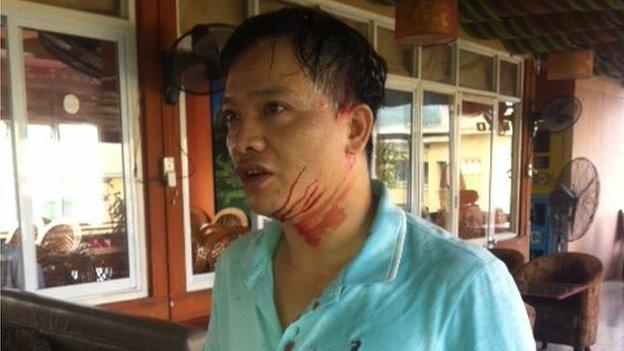#BBCtrending: Vietnam's 'online army'
- Published

Nguyen was attacked in May, after posting pro-democracy messages on Facebook
A string of Vietnamese activists have had their Facebook accounts suspended, and claim to have been targeted by an 'online army' sponsored by the government.
When David Nguyen - a human rights lawyer - tried to log in to the site, he found his account had been blocked. He was faced with a message from Facebook which said he was suspected of posting fraudulent personal information. He wasn't the only one. At least 100 users - mostly pro-democracy and human rights campaigners - have faced similar treatment, according to Viet Tan, a political group who oppose the communist government.
Although the blocks have been implemented by Facebook, it isn't the site itself that's to blame. Nguyen says he, and many like him, have been targeted by a rival team of site members - or "opinion shapers" - organised and paid by the government.
If that's the case, then how does their strategy work? When faced with multiple reports that someone is flouting the site rules, Facebook has little option but to suspend and investigate the account in question, and only reactivate it if the member can prove they are who they say they are. So government sponsored users are exploiting the rule, and systematically reporting the accounts of anyone who poses a challenge to the regime. Duy Hoang, a spokesperson for Viet Tan says this "online army" has been in operation for around two years, and earlier this year the government acknowledged its existence.
The difficulty for the campaigners is that many have indeed created accounts using false information, through fear they may be targeted by the government in the real world. Nguyen - whose Facebook account uses his real name - was attacked at a coffee shop in May after posting information about a protest against China. Five men he says were state sponsored security officers smashed a glass over his head three days after uploading the information.
In order to reactivate their accounts, some campaigners have sent confirmation of their real names, and other personal information, to Facebook. They are now far more likely to hold back from commenting freely on the site, says Nguyen.
Facebook has particular significance in Vietnam, where traditional media is entirely controlled by the government. Although the site is officially banned, it is used by around 25 million people in the country. "In a society where there is no free media... Facebook is the new town square," says Hoang. Campaigners use it to organise groups and hold mass discussions.
Neither the Vietnamese government nor Facebook would comment on this specific series of account suspensions. Facebook released a statement reiterating its rule that all members must use their real names.
You can follow BBC Trending on Twitter @BBCtrending, external
All our stories are at bbc.com/trending